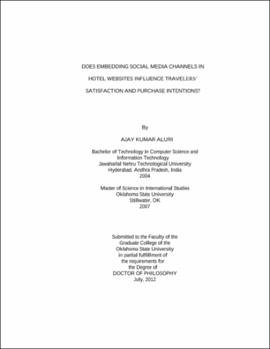| dc.contributor.advisor | Slevitch, Lisa | |
| dc.contributor.author | Aluri, Ajay Kumar | |
| dc.date.accessioned | 2013-11-26T08:33:17Z | |
| dc.date.available | 2013-11-26T08:33:17Z | |
| dc.date.issued | 2012-07 | |
| dc.identifier.uri | https://hdl.handle.net/11244/7199 | |
| dc.description.abstract | Scope and Method of Study: In the Internet world today, social media channels have emerged as a top share of Internet usage, and more travelers have started using them to make their hotel plans and purchases. Because of the recommendations of researchers and practitioners, hotel organizations have already embraced social media and have embedded their links on their host websites. Still, research is lacking concerning how embedded social media channels influence traveler satisfaction and their purchase intentions in the hotel industry. The main purpose of this study was to examine the differences between travelers that use social media channels and those who don't use them. In addition, this study examined how social media channels influences gratification factors, traveler satisfaction, and purchase intentions. A post-test only experimental design was conducted by using two, almost-identical hotel websites, which were created just for this study. A total of 378 responses were analyzed using multivariate analysis of variance and path analysis of structural equation modeling. | |
| dc.description.abstract | Findings and Conclusions: The results of this study revealed that embedded social media channels on the hotel website moderately increased travelers' perceived social interaction. Regarding the effects of experimental modifications of the website, the results indicated that the two outcome variables--traveler satisfaction and purchase intentions--were not directly influenced, although there was a marginal indirect influence of embedded social media channels on travelers' satisfaction, through perceived social interaction. There was no significant difference in perceived informativeness and perceived enjoyment for travelers who used website with embedded social media channels, compared to the website that didn't have them. The perceived enjoyment of the hotel website statistically predicted an increase in traveler satisfaction and purchase intentions. The perceived informativeness of the hotel website strongly influenced traveler satisfaction. Traveler satisfaction was identified as a strong mediator between gratification factors and purchase intentions. Meanwhile, the perceived informativeness, enjoyment, and social interaction of the host website play a major role in travelers' satisfaction during their initial visit to the host website. | |
| dc.format | application/pdf | |
| dc.language | en_US | |
| dc.rights | Copyright is held by the author who has granted the Oklahoma State University Library the non-exclusive right to share this material in its institutional repository. Contact Digital Library Services at lib-dls@okstate.edu or 405-744-9161 for the permission policy on the use, reproduction or distribution of this material. | |
| dc.title | Does embedding social media channels in hotel websites influence travelers' satisfaction and purchase intentions? | |
| dc.contributor.committeeMember | Hancer, Murat | |
| dc.contributor.committeeMember | Njite, David | |
| dc.contributor.committeeMember | Larzelere, Robert | |
| osu.filename | Aluri_okstate_0664D_12274.pdf | |
| osu.accesstype | Open Access | |
| dc.type.genre | Dissertation | |
| dc.type.material | Text | |
| dc.subject.keywords | embedded social media channels | |
| dc.subject.keywords | hotel websites | |
| dc.subject.keywords | purchase intentions | |
| dc.subject.keywords | social networking sites | |
| dc.subject.keywords | travelers' satisfaction | |
| thesis.degree.discipline | Human Sciences | |
| thesis.degree.grantor | Oklahoma State University | |
